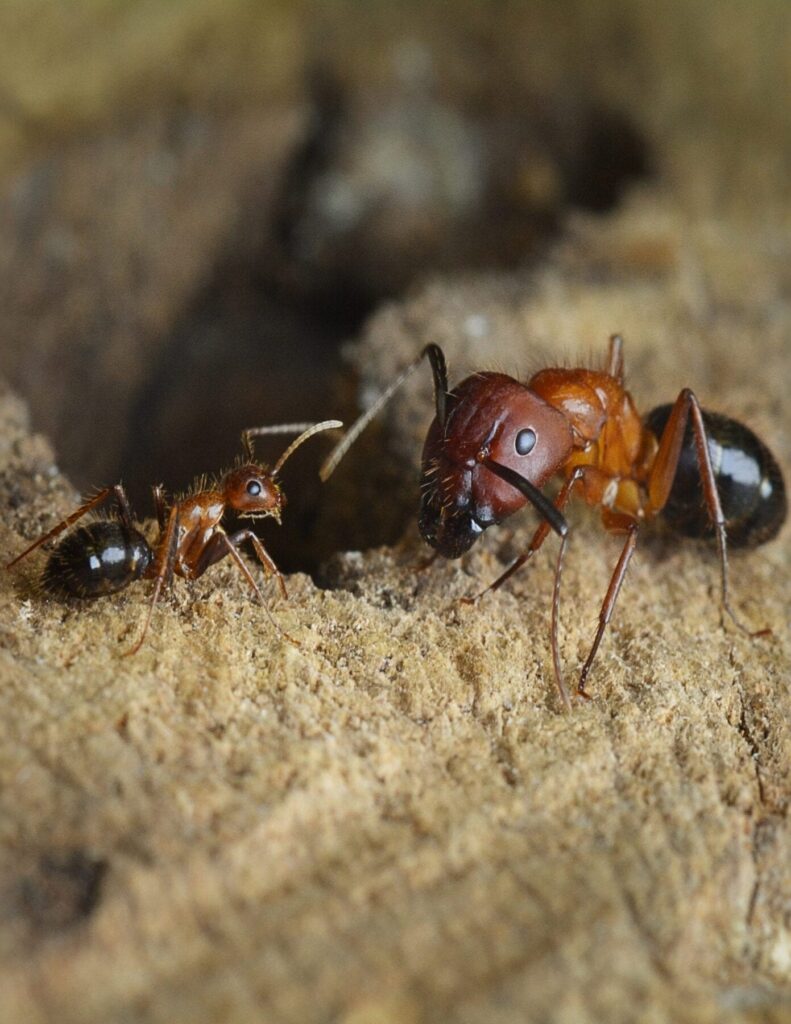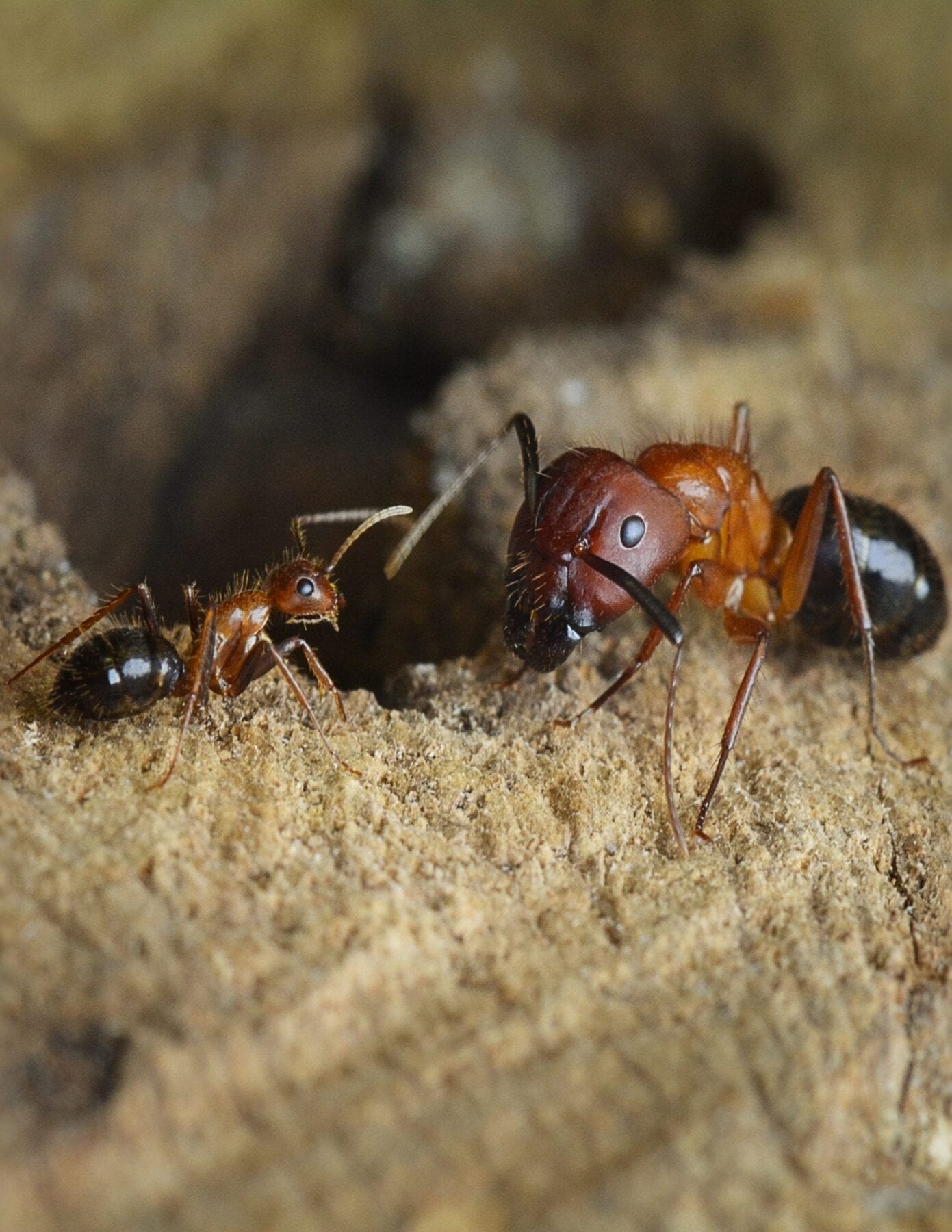
Credit: The lab of Shelley Berger, PhD, Perelman School of Medicine, University of Pennsylvania
Discovery of malleable epigenetic processes in ant brains has implications for the study of human behavior and disease
In Florida carpenter ant colonies, distinct worker castes called minors and majors exhibit pronounced differences in social behavior throughout their lives. In a new study published today in Science, a multi-institution team anchored at University of Pennsylvania found that these caste-specific behaviors are not set in stone. Rather, this pioneering study shows that social behavior can be reprogrammed, indicating that an individual’s epigenetic, not genetic, makeup determines behavior in ant colonies.
Epigenetics is the study of stable, or persistent, changes in gene expression that occur without changes in DNA sequence. Epigenetic regulation has been observed to affect a variety of distinct traits in animals, including body size, aging, and behavior. However, there is an enormous gap in knowledge about the epigenetic mechanisms that regulate social behavior.
Ants provide ideal models to study social behavior, because each colony is comprised of thousands of individual sisters — famously, the queen and all workers are female — with nearly identical genetic makeup, much like human twins. However, these sisters possess stereotypically distinct physical traits and behaviors based on caste.
In a previous study, the authors created the first genome-wide epigenetic maps in ants. This revealed that epigenetic regulation is key to distinguishing majors as the “brawny” soldiers of carpenter ant colonies, compared to minors, their smaller, “brainier” sisters. Major ants have large heads and powerful mandibles that help to defeat enemies and process and transport large food items. Minor ants are much smaller, outnumber majors two to one, and assume the important responsibility of searching for food and recruiting other ants to help with the harvest. Compared to majors, these foraging minors have genes involved in brain development and neurotransmission that are over expressed.
In the new findings, an interdisciplinary research team led by senior author Shelley Berger, PhD, from the Perelman School of Medicine at the University of Pennsylvania, in collaboration with teams led by Juergen Liebig from Arizona State University and Danny Reinberg from New York University, found that caste-specific foraging behavior can be directly altered, by changing the balance of epigenetic chemicals called acetyl groups attached to histone protein complexes, around which DNA strands are wrapped in a cell nucleus. To reveal this exquisite control, the team demonstrated that foraging behavior could be reprogrammed using compounds that inhibit the addition or removal of these acetyl groups on histones (histone acetylation), in turn changing the expression of nearby genes.
Berger is the Daniel S. Och University Professor in the Departments of Cell & Developmental Biology, Biology, and Genetics. She is also the director of the Penn Epigenetics Program.
“The results suggest that behavioral malleability in ants, and likely other animals, may be regulated in an epigenetic manner via histone modification,” said lead author Daniel F. Simola, PhD, a postdoctoral researcher in the Penn Department of Cell and Developmental Biology. Simola is co-lead author with Riley Graham, a doctoral student in the Berger lab.
It’s All About the Histone
The almost decade-long collaboration between the Berger, Liebig, and Reinberg labs, supported by the Howard Hughes Medical Institute, blends molecular biology with observations of animal behavior to understand how caste-based differences arise in ants.
Ants, as well as termites, and some bees and wasps, are eusocial (or “truly social”) species. Previous work suggested that histone acetylation could create dramatic differences in gene expression between genetically identical individuals, contributing to the physical differences in body size and reproductive ability between ant castes.
The current study expands on this narrative by showing that caste behaviors are also regulated by epigenetic changes in histone acetylation. To do so, the team used the fact that chromatin structure — the coiling of the DNA around histone proteins — can be altered by the addition of acetyl groups, which ultimately changes the compaction of the genome. Modifications like histone acetylation allow DNA to uncoil, whereas others cause DNA to become tightly compact and inaccessible to the proteins that regulate gene expression.
Knowing that histone modifications are used to establish specific features of different tissues within an individual led the team to ask whether histone modifications might also be used to create differences in traits like social behavior between individuals, notably the brawny majors and the brainy minors.
In the Science paper, the team fed foraging minors a chemical inhibitor that prevents cells from removing acetyl groups from histones. This treatment enhanced foraging and scouting for food, and correspondingly, led to increased histone acetylation near genes involved in neuronal activity. Conversely, inhibiting the addition of acetyl groups led to decreased foraging activity.
In contrast to the dramatic boost in foraging seen in minors, feeding mature major workers these inhibitors caused little to no increase in foraging. However, the team found that directly injecting these epigenetic inhibitors into the brains of very young majors immediately increased foraging, reaching levels normally only observed in minors. Additionally, a single treatment with these inhibitors was sufficient to induce and sustain minor-like foraging in the majors for up to 50 days. These results suggest that there is an “epigenetic window of vulnerability” in young ant brains, which confers increased susceptibility to environmental manipulations, such as with histone-modifying inhibitors.
Berger observes that all of the genes known to be major epigenetic regulators in mammals are also present in ants, which makes ants “a fantastic model for studying principles of epigenetic modulation of behavior and even longevity, because queens have a much longer lifespan compared to the major and minor workers. Because of the remarkable window we have uncovered, ants also provide an extraordinary opportunity to explore and understand the epigenetic processes that come into play to establish behavioral patterns at a young age. This is a topic of increasing research interest in humans, owing to the growing prevalence of behavioral disorders and diseases and the appreciation that diet may influence behavior.”
Broader Implications
One important gene implicated in the ant study is CBP, which is an epigenetic “writer” enzyme that alters chromatin by adding acetyl groups to histones. CBP had already been implicated as a critical enzyme facilitating learning and memory in mice and is mutated in certain human cognitive disorders, notably Rubinstein-Taybi syndrome. Hence, the team’s findings suggest that CBP-mediated histone acetylation may also facilitate complex social interactions found in vertebrate species.
The authors suspect that CBP’s role as an epigenetic writer enzyme contributes to patterns of histone acetylation that enhance memory pathways related to learned behaviors such as foraging. Differences in CBP activity between minor and major castes may guide unique patterns of gene expression that fine tune neuronal functions for each caste.
“From mammalian studies, it’s clear this is an important protein involved in learning and memory,” Berger noted. “The finding that CBP plays a key role in establishing distinct social behaviors in ants strongly suggests that the discoveries made in ants may have broad implications for understanding social organization.”
Read more: Penn-Led Team Reprograms Social Behavior in Carpenter Ants Using Epigenetic Drugs
The Latest on: Reprograming social behavior
[google_news title=”” keyword=”reprograming social behavior” num_posts=”10″ blurb_length=”0″ show_thumb=”left”]
via Google News
The Latest on: Reprograming social behavior
- Social mediaon April 25, 2024 at 10:47 am
Newsweek magazine delivered to your door Newsweek Voices: Diverse audio opinions Enjoy ad-free browsing on Newsweek.com Comment on articles Newsweek app updates on-the-go ...
- Mapping the Neural Circuit of Social Avoidanceon April 25, 2024 at 7:51 am
Moving forward, Lin plans to continue studying this circuit to uncover other neuronal populations and brain regions that may contribute to social avoidance learning. She also wants to examine this ...
- Understanding the spread of behavior: How long-tie connections accelerate the speed of social contagionon April 23, 2024 at 10:44 am
Human beings are likely to adopt the thoughts, beliefs, and behaviors of those around them. Simple decisions like what local store is best to shop at to more complex ones like vaccinating a child are ...
- Social Savvy: The rise of social SEO – Nov 2023on April 21, 2024 at 5:16 am
However, a paradigm shift is underway, with the younger internet users increasingly turning to social media platforms like Instagram, TikTok, YouTube and others as their go-to search engines rather ...
- Best Social Casinos To Play In 2024on April 20, 2024 at 5:00 pm
In the absence of real-money online casinos in many states, social casinos started to gain popularity. They popped up in the US more than 10 years ago, and new ones have been launching ever since.
- Miss Manners: Tactful approaches to correcting social behavior in your son’s partneron April 18, 2024 at 4:00 am
Can Miss Manners please advise how I can let her know that this is not acceptable behavior? I have tried ... and/or stored by us and social media and other third-party partners in accordance ...
- Social Mediaon April 16, 2024 at 5:01 pm
The biggest stories of the day delivered to your inbox.
- PUBH.5010 Social and Behavioral Determinants of Health (Formerly PUBH 501)on April 7, 2024 at 9:56 pm
This course introduces core concepts of social and behavioral determinants of health and provides a foundation for the analysis of social, political and economic influences on health and their role in ...
- Social Psychology Newson April 7, 2024 at 5:00 pm
The researchers collected data on the social behavior of females for eight years and ... Lonely 12 Year-Olds Less Likely to Gain Employment in Adulthood Mar. 14, 2024 — New research has found ...
- Trump's social media company loses billions in value as stock price swings wildlyon April 1, 2024 at 12:00 pm
Shares of Trump Media & Technology Group, whose primary asset is the Truth Social platform, tumbled 21% on Monday, closing at $48.66, or below its opening price last Monday of $49.90 per share.
via Bing News











